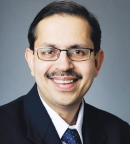
I believe that addressing the ancillary needs of cancer patients is as important in their overall well-being as their clinical interventions.— Neeraj K. Arora, PhD
Tweet this quote
At this year’s ASCO Quality Care Symposium, Neeraj K. Arora, PhD, Associate Director at the Patient-Centered Outcomes Research Institute, opened his presentation by stressing that integrating the patient’s voice and experience into the clinical setting produces better health outcomes.1 Dr. Arora, a cancer survivor himself, set the stage for his talk with a quote from The Emperor of All Maladies: “Cancer begins and ends with people. In the midst of scientific abstraction, it is sometimes possible to forget this one basic fact….”
One question that is ubiquitous among panic-struck people upon hearing a diagnosis of cancer: “What is going to happen to me now?” However, Dr. Arora noted that today another question is just as prevalent: “Will I receive care from a health-care system that will support me through this major crisis life has thrown at me?”
According to Dr. Arora, studies examining the support needs of patients in their own voices have demonstrated a wide variety of oftentimes unmet essentials in clinical care. For instance, there is a crucial need for postdiagnosis information that is patient-friendly and leads to proper decision-making. Moreover, Dr. Arora emphasized that patients require emotional support to help them deal with uncertainty as they navigate the health-care system.
“I believe that addressing the ancillary needs of cancer patients is as important to their overall well-being as their clinical interventions. And this can only happen if we make the effort to listen to our patients’ own quality-of-care assessments,” said Dr. Arora.
Capturing the Patient Experience
In 2013, the Institute of Medicine (IOM) released a comprehensive report, “Delivering High-Quality Cancer Care: Charting a New Course for a System in Crisis.” As highlighted by Dr. Arora, this report stated unequivocally that the most important goal of a high-quality delivery system is meeting the needs of patients and families. To that end, the report recommended the development of a national quality-reporting system for cancer care as part of a learning health-care system. Dr. Arora noted that for a national quality-reporting system to be successful, it needs input from the patient perspective to bolster its clinical value and demonstrate how well we are doing on patient-centered aspects of care.
Dr. Arora then turned to several population- and organization-based initiatives currently taking place in the United States and Canada, whose goals are to systematically capture cancer patients’ experiences. First up was the Health Information National Trends Survey of the National Cancer Institute (NCI), which collects data about the trends and patterns of the use of cancer-related information by the American public.
Survey and Relevant Study Data
Dr. Arora explained that during the 2012 to 2013 iteration of the Health Information National Trends Survey, when he served at NCI, he and his colleagues incorporated items on patient-centered care based on a conceptual framework asking the American public 6 key questions about the quality of their care. The questions were based on interactions with their providers in the past 12 months and asked, for example, whether their providers gave them a chance to ask health-related questions, how often their feelings or emotions were tended to, how often they were involved in decision-making, and how often their uncertainty about their health was addressed. Although the data were based on the general population, the findings are similar to those of subpopulations of patients with cancer.
The survey data were organized into three categories on a bar graph to assess whether patient-centered care was delivered: never/sometimes, usually, and always. At first glance, the data show that about 80% of the survey populations feel they usually/always receive patient-centered care. However, the red graph bars indicating never/sometimes indicated that about one in five cancer patients feels he or she is not receiving patient-centered care on issues such as emotional and decision-making support.
“These red bars provide significant opportunity for improvement. In a high-reliability patient-centered health-care system, these negative data should be 5% or less. And if we want to meet the goals set out in the IOM cancer crisis report, we need to listen to the voices of our patients,” stated Dr. Arora.
A study called the Patient-Reported Outcomes and Side-Effects Study collected symptom experience data from about 2,500 patients with breast and colon cancers who were 4 to 12 months postdiagnosis. The patients were accrued from 17 community cancer centers. The study’s goal was to gather data for ongoing surveillance of cancer centers and for quality improvement.
Dr. Arora underscored three key questions about how health-care providers dealt with symptoms of pain, fatigue, and emotional distress. Only about half of the patients reported being counseled for emotional distress, which according to Dr. Arora highlights the need for incorporating an aural package of tools geared to listening to the needs of our patients.
Full Spectrum of Patient-Centered Care
Dr. Arora presented other key data demonstrating the importance of assessing the full spectrum of patient-centered care. He noted a novel real-time patient measurement tool approach used by the Ontario Cancer System, in which the patient experience is captured at point of care using 11 questions; it averages about 4 minutes per patient. The data are linked with cancer registry and administrative data. “These data are being used not only for influencing quality improvement at the regional cancer centers, but also system wide,” said Dr. Arora.
Dr. Arora concluded by stressing that to deliver high-quality care, we must provide our patients with ongoing support, during and between clinical encounters. Most important, the philosophy of patient-centeredness must become a system-wide property. “To meet these goals, we need to integrate patient-centered measures with quality indicators as part of a rapid learning health system,” said Dr. Arora. ■
Disclosure: Dr. Arora reported no potential conflicts of interest.
Reference

